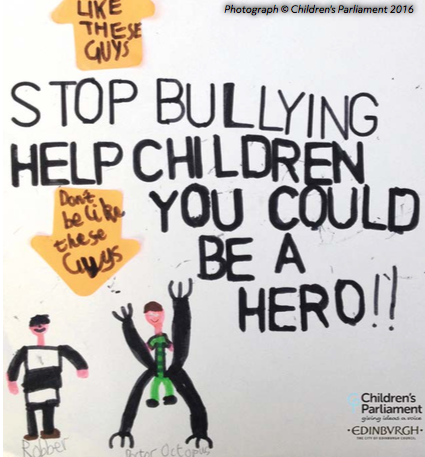Call 16: Work together to build cultures where every voice is valued, and create a society free from bullying
By Katie Ferguson
Too many children and young people’s lives are undermined by bullying. Our research suggests a third of young people experience bullying, but that figure may be higher given that many won’t admit or realise they are being bullied.
But while bullying is not new, a raft of research has given us more insight into its nature and how it affects particular groups.
The majority (71 per cent) of lesbian, gay, bisexual and transgender (LGBT) young people experience bullying in school on the grounds of being LGBT, while two-thirds of young people who have learning disabilities and/or autism spectrum disorders have been bullied.
More than half (55 per cent) of Muslim young people encountered verbal Islamophobia in high school, and half of all school children who have a disfigurement have experienced bullying because of it.
Where and how bullying takes place has also evolved. In today’s digital age, children and young people no longer distinguish between online and offline lives. Similarly, face-to-face and online bullying aren’t always exclusive – as one S3 pupil recently summed up, “bullying isn’t online or offline, it’s everywhere”.
And as another young person told us: "we are all part of the problem if we do not challenge it".
In the last decade in particular, a huge amount has changed in how we address bullying. In Scotland we’ve developed a globally unique anti-bullying approach, captured in the Scottish Government’s guidance, Respect for All. This approach takes a progressive step away from labelling children and young people as ‘bullies’ or ‘victims’ which disempowers and is ineffective in changing behaviour.
Rather we focus on individuals’ behaviour; addressing the impact it’s had, fostering positive relationships and nurturing cultures built on respect. In addition, Respect for All is explicit in its message that bullying based on prejudiced views has no place in Scotland, and should be swiftly addressed.
Despite this progress, there is much still to be done and renewed energy and focus on the prevention of bullying is critical. This means creating the right culture and ethos in our schools and youth services, built on respect and inclusion – a culture where bullying cannot thrive. Effective leadership at all levels, meaningful youth participation and genuine parental involvement can each help create the foundation for a culture which has at its heart mutual respect and a value for the wellbeing of every child.
In one school in North Lanarkshire, an Anti-Bullying committee was established. Made up of pupils from the school, in its two years of existence the committee has introduced an anti-bullying policy, created several opportunities for young people to report bullying and has raised the profile of bullying across the school. As one young person put it, it has “done our school the world of good”.
Respect for All provides us with a framework around which all anti-bullying work should be based. Our challenge now is to ensure its principles are translated into a consistent approach across Scotland for every child and young person – including those who are bullied and those who bully others.
Follow #25Calls to see which organisations have endorsed this call.
Article 31 – United Nations Convention on the Rights of the Child: '...the right to be protected from direct and indirect discrimination...'

25 Calls
Return to the main 25 Calls page to find out what change others are calling for
Visit the pageUnited Nations Convention on the Rights of the Child
Article 2: "...the right to be protected from direct and indirect discrimination."
Learn more